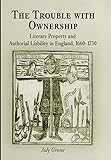The Trouble with Ownership : Literary Property and Authorial Liability in England, 166-173 / Jody Greene.
Material type: TextSeries: Material TextsPublisher: Philadelphia : University of Pennsylvania Press, [2011]Copyright date: ©2005Description: 1 online resource (288 p.) : 8 illusContent type:
TextSeries: Material TextsPublisher: Philadelphia : University of Pennsylvania Press, [2011]Copyright date: ©2005Description: 1 online resource (288 p.) : 8 illusContent type: - 9780812238624
- 9780812202090
- Authorship -- History -- 17th century
- Authorship -- History -- 18th century
- Copyright -- England -- History -- 17th century
- Copyright -- England -- History -- 18th century
- English literature -- 18th century -- History and criticism
- English literature -- Early modern 500-1700 -- History and criticism
- English literature -- Early modern
- English literature -- 18th century -- History and criticism
- English literature -- Early modern, 1500-1700 -- History and criticism
- Liability (Law) -- Great Britain -- History -- 17th century
- Liability (Law) -- Great Britain -- History -- 18th century
- Liability (Law) -- Great Britain -- History -- 17th century
- Liability (Law) -- Great Britain -- History -- 18th century
- Literature
- LITERARY CRITICISM / European / English, Irish, Scottish, Welsh
- Cultural Studies
- Law
- Literature
- Medieval and Renaissance Studies
- 820.9/3554/09032
- online - DeGruyter
- Issued also in print.
| Item type | Current library | Call number | URL | Status | Notes | Barcode | |
|---|---|---|---|---|---|---|---|
 eBook
eBook
|
Biblioteca "Angelicum" Pont. Univ. S.Tommaso d'Aquino Nuvola online | online - DeGruyter (Browse shelf(Opens below)) | Online access | Not for loan (Accesso limitato) | Accesso per gli utenti autorizzati / Access for authorized users | (dgr)9780812202090 |
Browsing Biblioteca "Angelicum" Pont. Univ. S.Tommaso d'Aquino shelves, Shelving location: Nuvola online Close shelf browser (Hides shelf browser)
Frontmatter -- Contents -- Introduction -- PART I. The Trouble with Ownership -- Chapter 1. Authorship and the Regulation of the Press -- Chapter 2. The Trials of Ownership: Finding the Author in Court -- PART II. The Dangerous Fate of Authors -- Chapter 3. Daniel Defoe, the Act of Anne, and the Obligations of Ownership -- Chapter 4. Revenge of the Straw Woman: Disowning The Dunciad -- Chapter 5. Hostis Humani Generis: Owning Polly -- Notes -- Bibliography -- Index -- Acknowledgments
restricted access online access with authorization star
http://purl.org/coar/access_right/c_16ec
Copyright and intellectual property issues are intricately woven into any written work, but the precise nature of this relationship has plagued authors, printers, and booksellers for centuries. What does it mean to own the products of our intellectual labors in our own time? And what was the meaning three centuries ago, when copyright laws were first put into place?Jody Greene argues that while "owning" one's book is critical to the development of modern notions of authorship, studies of authorial property rights have in fact lost sight of the most critical valence of owning in early modern England: that is, owning up to or taking responsibility for one's work. Greene puts forth what she calls a "paranoid theory of copyright," under which literary property rights are a means of state regulation to assign responsibility for printed works, to identify one person who will step forward and claim the work in exchange for the right to reap the benefits of the literary marketplace. Blending research from legal, historical, and literary archives and drawing on the troubled authorial careers of figures such as Roger L'Estrange, Elizabeth Cellier, Daniel Defoe, John Gay, and Alexander Pope, The Trouble with Ownership looks to the literary culture of early modern England to reveal the intimate relationship between proprietary authorship and authorial liability.
Issued also in print.
Mode of access: Internet via World Wide Web.
In English.
Description based on online resource; title from PDF title page (publisher's Web site, viewed 24. Apr 2022)









